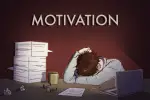As the race toward graduation draws to a close, your life is probably busier than ever.
You are accountable to your professors, your current employer, potential employers, relatives who want a detailed itinerary of your life plan, strangers who want a detailed itinerary of your life plan, your significant other who is tired of hearing about your fucking “life plan,” and the lenders who are lurking nearby, waiting impatiently for six months to go by so they can promptly start harassing you for loan payments.
Fulfilling all your obligations while adequately preparing for an uncertain future is a tall order. Here are some strategies for dominating your to-do list without letting existential dread dominate you.
1. Control Your Space
You have had four years to figure out what type of workspace works best for you.
Maybe you perform best in the soft bustle of a coffee shop, or maybe in your room with your blinds drawn and A Tribe Called Quest blaring. Perhaps something in the middle is the best for you, like a library where you are quietly surrounded by like-minded people. Wherever you did your best, most effective cramming for finals over the years, force yourself to go there as often as possible.

Use that time to focus on schoolwork, theses, resumes, LinkedIn and other obligations. Establishing a specific workspace feels good, because it give you something to walk away from at the end of the day, creating a firm divide between your “work” and the rest of your life.
2. Start Early
Stress has a wonderful way of paralyzing you with fear. This paralysis can lead to behavior such as sleeping all day, Netflix binging and getting lost in the wonderful world of memes.
These can be healthy behaviors on occasion, but procrastinating only leads to more stress eventually, because your long, ambiguous to-do list will still be hovering over your head, becoming darker and meaner as time goes on.
3. Utilize Campus Resources
Check out what programs your school offers for reducing stress. Some schools may offer meditation sessions or yoga classes, which are definitely worth setting aside time for.
Many colleges offer free or discounted counseling services, which you should take advantage of if you feel that your stress is becoming difficult to manage.
4. One Task at a Time
If you use too much of your brain’s willpower focusing on all the things that can go wrong, you won’t be able to finish everything, and even if you do, it won’t be the quality you are capable of, because you weren’t able to engage all of your brain power.

You already know that you need a quality resume to be able to get a quality job; you don’t need to keep rehashing that in your mind. Set a goal to create your resume, and then break that goal down into smaller tasks. Write an objective. List your work experience. List your skills.
These manageable goals will help you to feel accomplished, and focusing on each task without mentally tying it to the Big Picture will actually help you do better work. Before you know it, you will have a completed resume.
5. Set Realistic Expectations
There is no wiser time to be future-oriented than during the last year of college. But the transition into the “real world” doesn’t have to be seamless. It isn’t for most people, and it doesn’t have to be for you. Forgive yourself.
6. Commiserate … But Not Too Much
Pretty much everybody in your graduating class is going through the same crushing cycle of doubt and worry. Hashing out your feelings with people that are in the same place as you can be validating, but try to be balanced.
If all of your social interactions for the next year begin with the sentence, “I’m having an existential crisis!” you’ll make the reality of your situation appear bleaker than it really is.
This is a stressful period in your life, but it is just that. A period. It will pass.
When you are hanging out with your peers, make it a point to engage in an activity, such as dancing or hiking, that takes you outside of yourself for a little bit.
Hanging out with people who have already crossed the graduation stage can be helpful. They have experienced what you are going through, and emerged on the other side. They will be able to provide you with useful tips, while keeping you grounded in a world that exists outside your confined reality of stress dreams and computer screens.
7. Eat Right (If You Can)
Stress eating is very tempting, and a little known study hack is that reading large amounts of esoteric writing and theory is far more enjoyable while shoving Hostess donettes in your face.
However, your immune system is weaker when you are under a lot of stress, making nutrition extra important. If your shoestring budget doesn’t allow you to buy vegetables in every color, consider taking a multivitamin.

Taking in a wide variety of nutrients creates optimal physical and mental conditions, including the ability to focus more closely. That’s right, there are other options besides coffee to improve your performance. (Although…why not do both?)
8. Give Yourself a Break
If you don’t give your brain a rest, you will not have the mental or emotional capacity to do quality work, and you could actually end up making things worse for yourself.
Play badminton with your boyfriend, do a puzzle with your cat. Exercise! Working out gives you endorphins, energy and inspiration, and can be an excellent way to vent frustration distract yourself from worry.
9. Get Comfortable with Uncertainty
No matter how hard you clench, you won’t be able to control everything, or even most things, about your environment. Many older people look back on their lives and see a trajectory that they never could have predicted, for better or for worse.
Focus intently on what you can control, and keep yourself open to the variety of possibilities that life has to offer.


















“Stress has a wonderful way of paralyzing you with fear.” Stress does not do any such thing! Stress and fear have very little in common, beyond the responses involved, which in fear are ordered and marvellously controlled, but in ANXIETY (not fear), our bodies have not evolved sufficiently to deal with the chaotic random responses, and stress sets up the stage for serious disorders of many kinds, including, Preventatists believe, cancer. thepreventatists.com